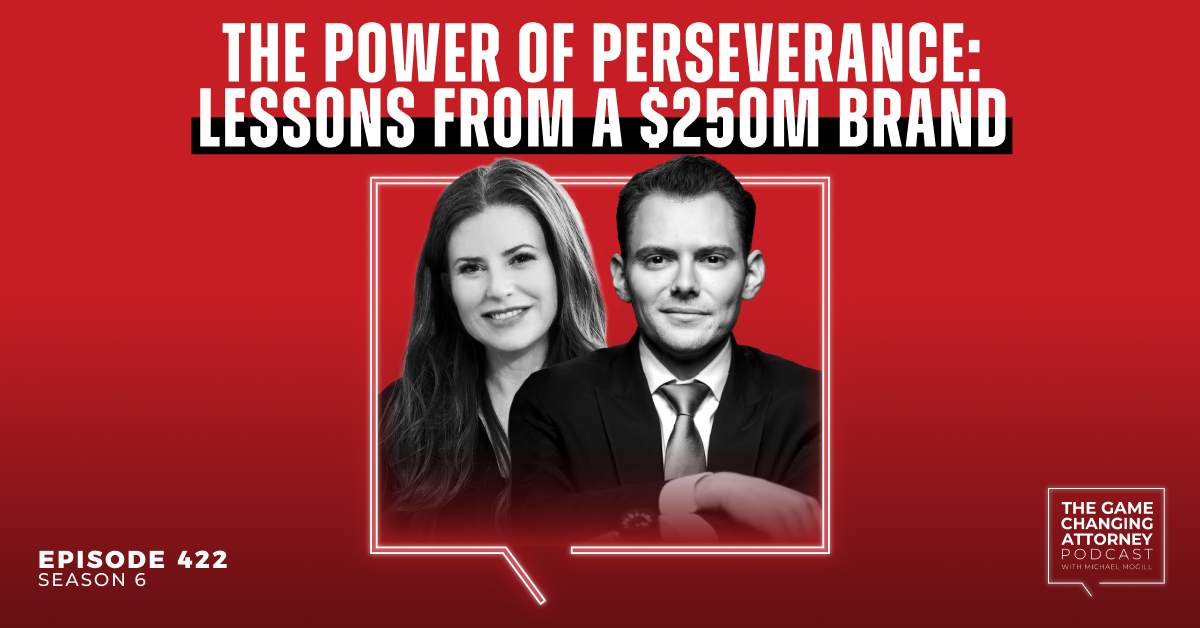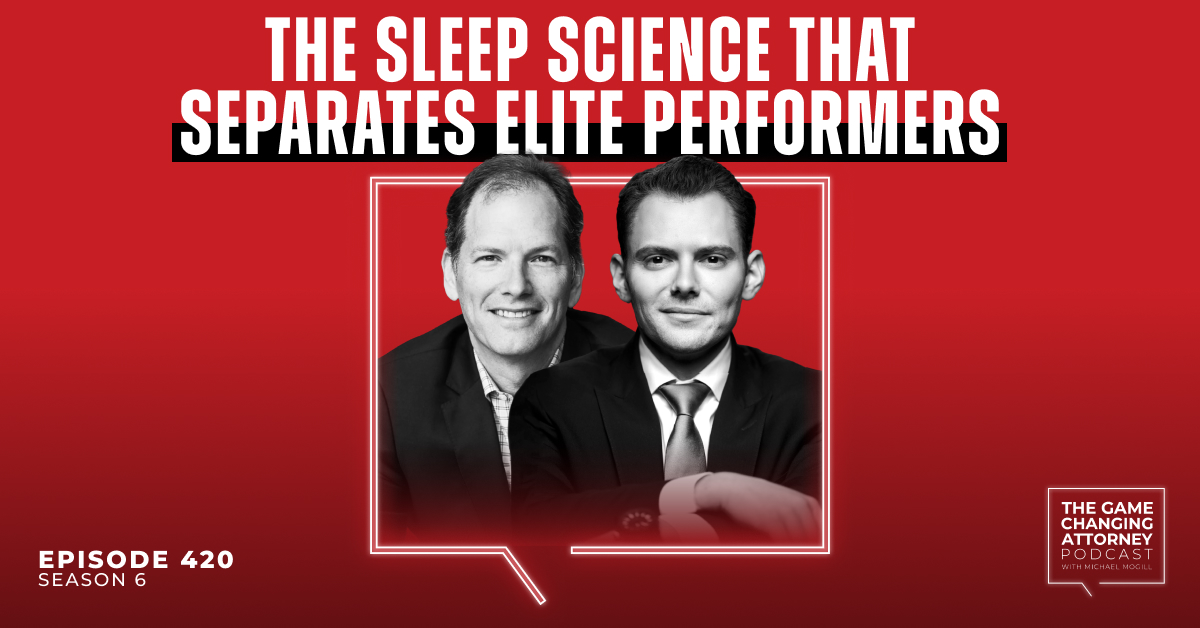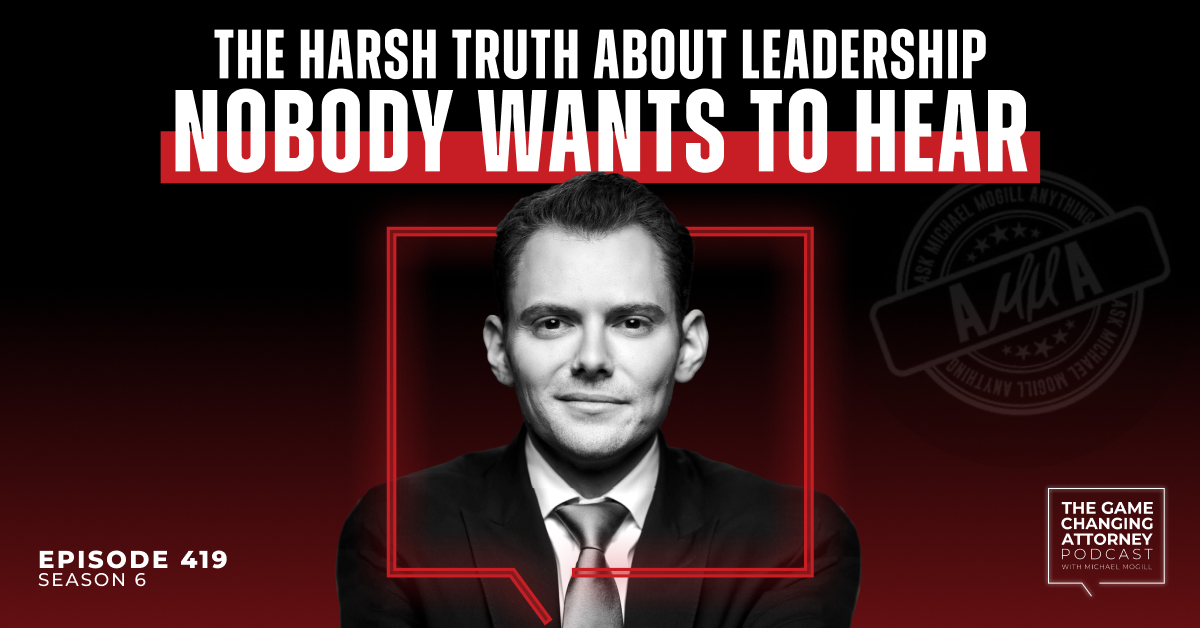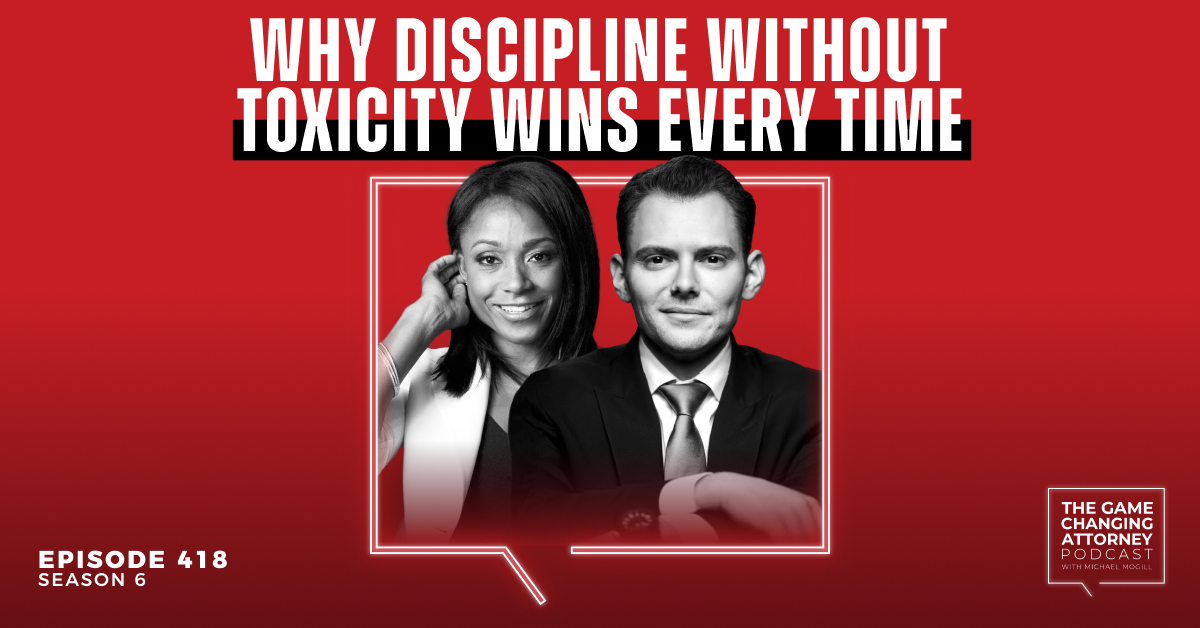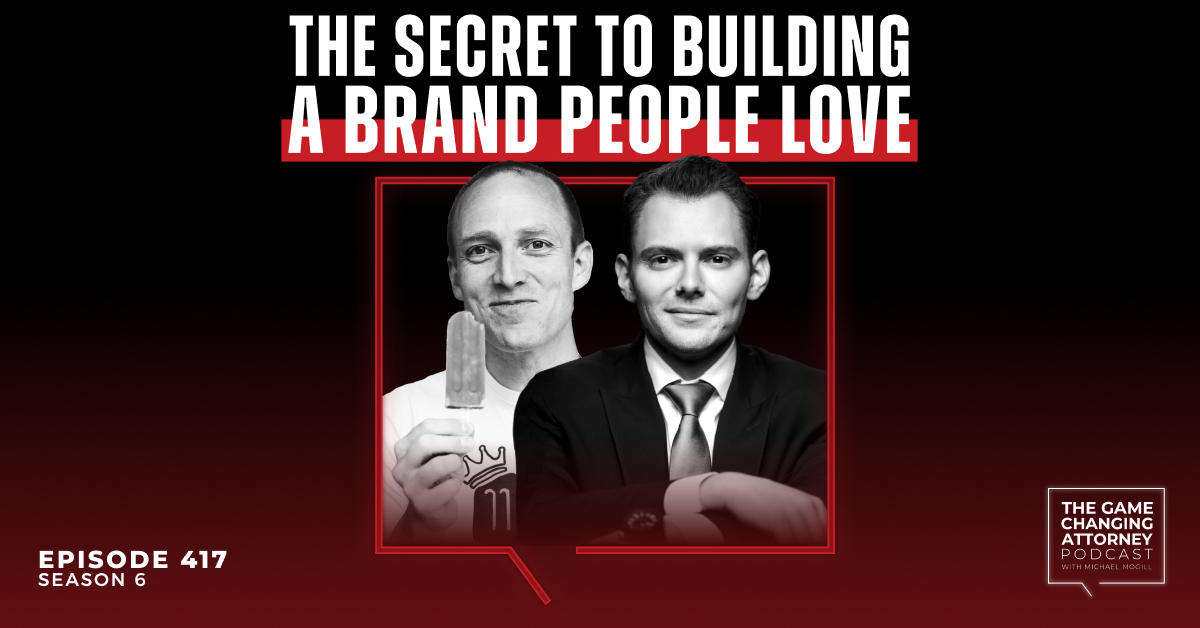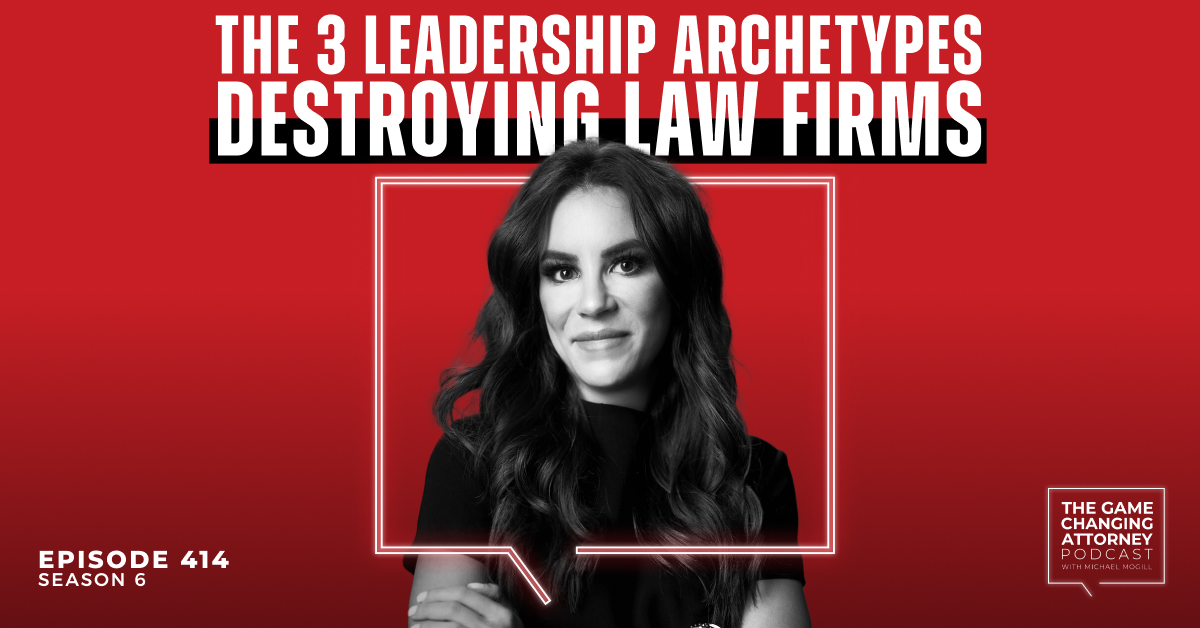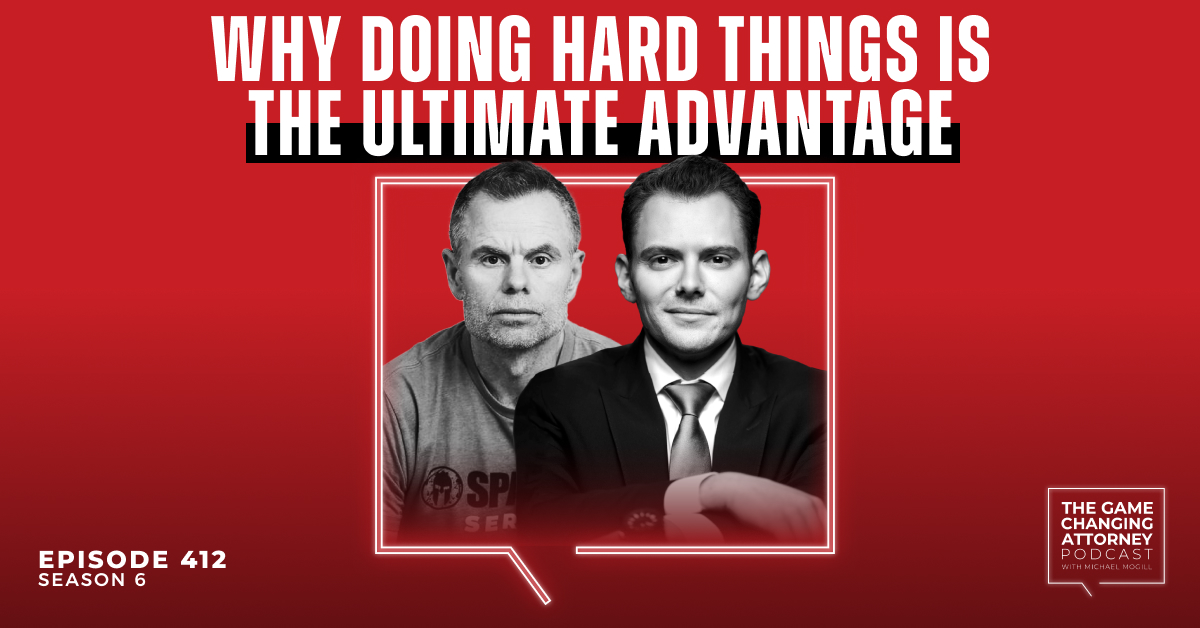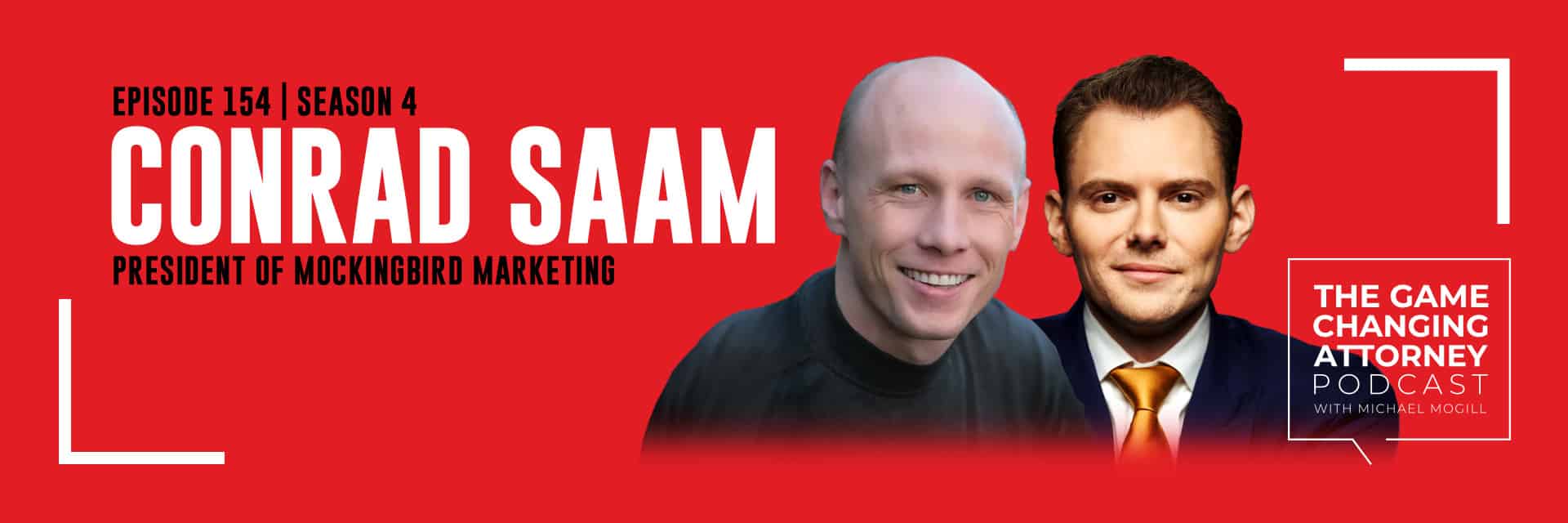
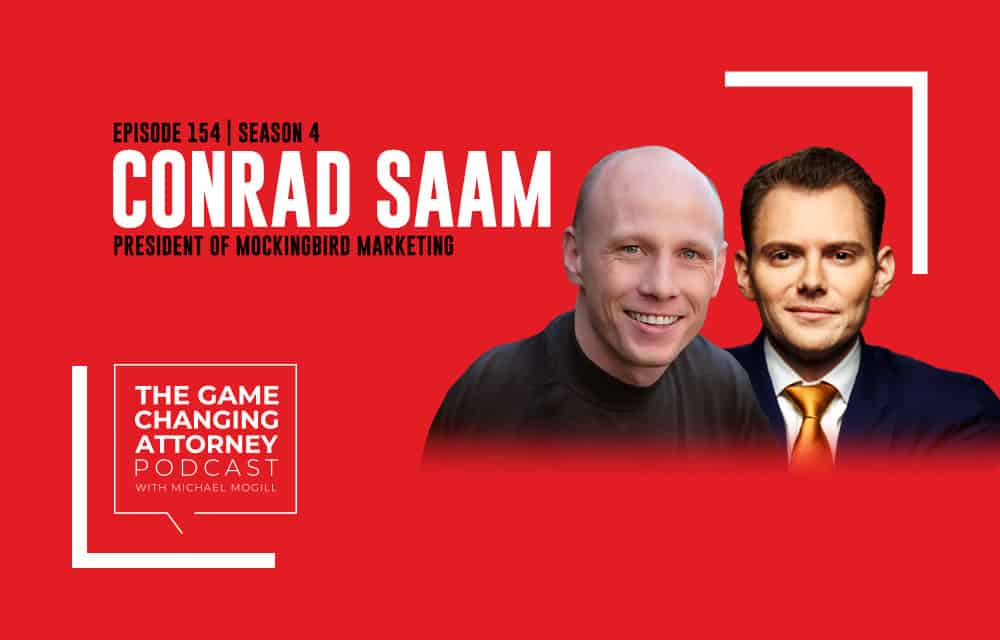
Episode 154 — Conrad Saam — Data Over Guesswork: The Strategies Behind Effective Legal Marketing
Every successful law firm owner understands the importance of effective marketing to grow their practice. But what actually works? How do you measure marketing success? What trends are worth investing in?
Mockingbird Marketing Founder & CEO Conrad Saam has all these answers and more.
On this episode of The Game Changing Attorney Podcast, Conrad and Crisp Founder & CEO Michael Mogill dive deep into:
- The difference between brand awareness and brand affinity
- Why you must borrow from today’s profits to build tomorrow’s revenue
- The real metrics that measure your marketing success
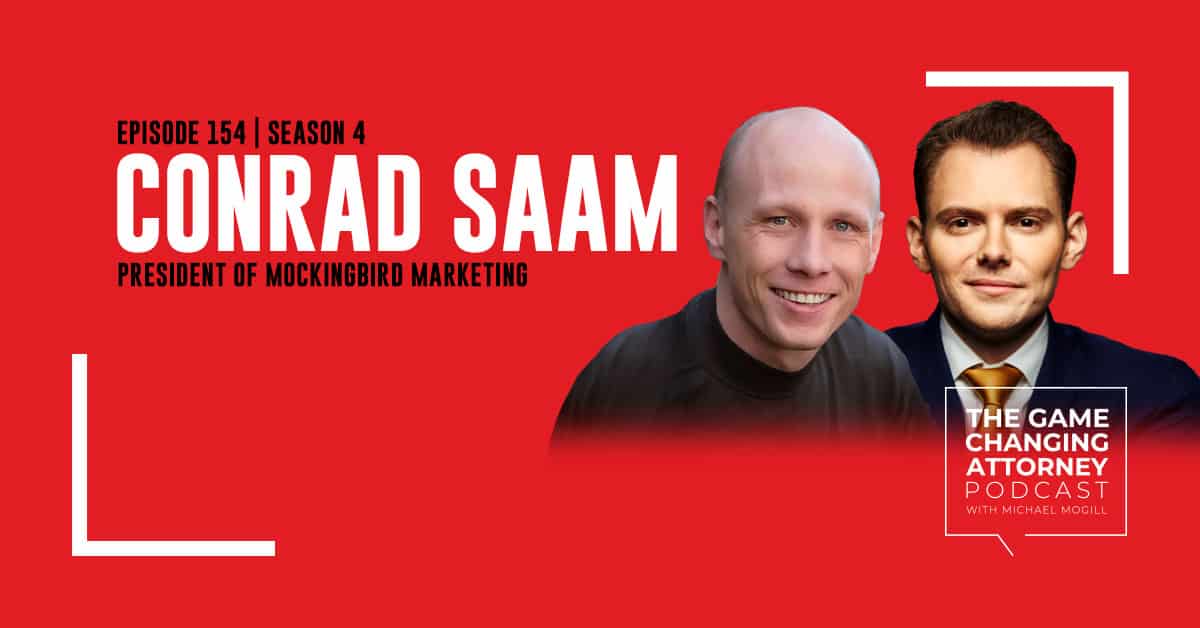
Listen & Subscribe
Show Notes:
The perfect time to get into legal marketing. “Back in 2006, there was this company called Avvo, which at the time no one had heard of. I was recruited into this business and I was number six there. At that time, no one knew SEO for legal. There was one dude — Tim Stanley at Justia, who was a brilliant dude who knew it — and then there was me. It was like the two of us, and that was it. So I got to learn technical marketing during a time when one-eyed man was king and we were killing it because no one else knew what they were doing. At the same time, when I was there, what I did get exposed to — and this goes back to my American dream and the the nobility of the American entrepreneur — there were businesses that were preying on lawyers who just didn’t understand, who didn’t want to ask the questions. There were really successful business models built on some MBA’s construct of how I can squeeze the most out of my client while delivering as little as possible, and that pissed me off. You can be successful as a businessperson, but how can you live with yourself if that’s what you’re systemically creating? I just couldn’t stand that. So I was learning all this stuff and I saw how it was kind of an abusive industry and most lawyers hate marketers. They hate us, and they wish they didn’t have to spend money with us — and I get that because it’s a well-earned reputation. So it was kind of easy for me to move out from Avvo into what I really liked doing while I was there: teaching lawyers about the internet, teaching lawyers about websites and H1 tags and Google Analytics and all that stuff. That was awesome, and so the next obvious career was for me to move into doing this for myself.”
Why lawyers? “I was sitting in the bar at the Seattle airport and discussing ‘What do you do?’ with the person next to me. They said, ‘Oh, you work with lawyers? I hate lawyers.’ You get that all the time. Having the privilege of working inside the legal industry, you see that the legal industry is the backstop for someone who’s having a really horrible day, and it doesn’t matter what that day is. That component, the legal component, is such a foundational crux to our society working the way it does, and it has to be there. I’m really lucky to be a really small part in that game. I love working with lawyers. I like that they’re direct. I like that they’re ambitious. It’s just a good match for me.”
What works in marketing? It depends. “You need to understand where you want to go, what your assets and liabilities are, and then figure out how to make that work. There is the right marketing mix for each law firm. This came out in a CallRail study that happened: No one looks to the agency for strategy. They’re always looking for the tactical execution, and so what’s missing is how do I look at this entire thing and understand strategically what is the right marketing mix for me to get where I want to go? That’s totally missing.”
Referrals are a key indicator. “The best ROI you can get is referral business, and that’s by being a great lawyer, treating your clients really, really well, and staying in touch with them. If you’re not getting a lot of referral business, you should call into question whether or not you’re treating your clients really, really well. It’s a very late lagging indicator, but if you find that no one ever refers you business, you might be a pain in the a** to work with. You are not a great lawyer from the user experience. You may be great in the courtroom, but from the user experience, they’re not going to go out on a limb to recommend you.”
Brand awareness vs. brand affinity. “I’m aware of Pepsi. You don’t have to tell me what Pepsi is. I’m never going to buy a Pepsi because I drink Coke. It’s the fundamental difference. There’s the want and the need. I really, really relate to a brand and I want to be a part of that. That is brand affinity and if you can make that jump, it changes the game.”
A new attribution model. “When people are looking for a car accident lawyer, you want them to think about Smith and Jones, not Google ‘car accident lawyer.’ That’s the whole point of this. The way we have traditionally done conversion attribution is to say, ‘Okay, I’m going to put together a really sophisticated system that understands when you click on this ad, you go to the website, I see a dynamic call tracking number from CallRail, I make that phone call that goes into my intake management software, ideally that ties into my matter management software, and I tie that all together and I can draw a little pie graph and it’s really good’ — which only works for those things that are direct response. It works because when you ask someone, ‘How did you hear about us?’ they’ll say, ‘Google’ or ‘the internet,’ which is really, really not helpful because on Google you’ve got local, organic, LSAs, and PPC to start out with, and you’re spending money on all four of those things, and you need to know if those are working. In a direct response situation, that’s super valuable and you have to have that automatic attribution modeling. But you also have to have the question…that has to be freeform. You don’t want a dropdown because you want that person to go into why they talked to you. Now the problem is I’ve got two conflicting pieces of data. I’ve got my automatic reporting and I’ve got my ‘how did you hear about us?’ reporting. It’s really hard for MBAs to draw a nice little graph when you have conflicting pieces of data, but you have to dig into that and really deeply, truly understand why that person is connected with you. Why have they connected with you? That person that looks like it came from pay per click actually called you because you have this great reputation among the running community, and that changes everything. So you have to take that discipline, and it’s hard and it takes time.”
How to build a holistic picture. “A really sophisticated CRM system will tell you that they’ve got the book. They’ll tell you all the times they’ve been on your website for the past 12 months, what pages they’ve looked at, which emails they’ve opened. So you can build a really good picture of who this person is and why they’re connecting with you, and you’ll see all these dots connecting to ‘I now want to become a client.’”
Shift your mindset around your numbers. “Think about the phone call answer rate. You have an 88% phone call answer rate. There’s two different ways to frame this. Either I answer the phone 88% of the time, or I miss 12% of our calls. It’s the same math. It’s a completely different mindset. You should spend so much of your time thinking about the things that you miss. The amazing athletes, the amazing entrepreneurs, they don’t focus on their wins. They focus on where they are not doing a great job. Like I’m a swimmer. I’m not celebrating my perfect stroke. I’m trying to find the things that are not perfect and fix those and make those small incremental improvements. Just by answering the phone from 88% to like 94% — think about it this way — just to get to average, you’re growing your revenue by 6%. Focus on reframing the question to not what you’re winning, but where are the places that you suck? Where are we missing?”
Where your marketing focus should be. “The work that you should put in is understanding the metrics. Understand the business. I don’t want to talk about page load time or any Screaming Frog reports or 404. Focus on the business metrics. What’s driving the business metrics? Then put the squeeze on where it’s actually not working, but drive the business metric. For the most part, you don’t need to be hands-on on all this stuff.”
Will ChatGPT impact SEO? “Here’s the thing with ChatGPT. From an SEO perspective, there’s three legs of the SEO tool: technology, content, and authority. By and large, most of you have good technology. You mostly have well-coded WordPress sites. Those problems by and large have been solved or are eminently solvable. Content? Content’s everywhere. The solo practitioner can now have an 800-page site. It’s easy to generate a lot of content…There’s lots of ways I can take ChatGPT, inputs from other scrubbers, and it’s completely indistinguishable by computers actually determine whether or not it’s AI-written or Conrad-written…From my take, the AI-generated content in the SEO game is going to just add more pages, but it’s not going to actually differentiate why you and why your page is ranking. That is really heavily focused on backlinks and the localization of your backlinks. If your SEO agency isn’t spending a lot of their time thinking about that, we’re missing the boat.”
The future of the legal industry. “The law firms that can figure out brand affinity — ‘I like you. I don’t even know what you do. Are you a divorce lawyer? A car accident? I can’t remember, but like you’re everywhere and I like you.’ If you can figure that out, that is a competitive advantage that is completely bulletproof. Brand awareness and brand affinity — and there are firms that are really going to great lengths to make that happen.”
How to build that affinity. “Don’t boil the market. Find a thing. Doesn’t matter what it is. Again, I’m all about those small local businesses. If you want to support the local businesses, that wins. Do that. If you are into running, do that. If you are into Christianity, do that. Build that affinity. You do not have to boil Atlanta. You can find that piece of your market and have people love you. Everyone is into something. That’s the cool thing about this. Everyone is into something, and so build it there. Start there and don’t try and boil the ocean.”
What does being a game changer mean to you? “If you support the nobility of the American entrepreneur — and then we talked about dark social and getting involved in your community — if all you do is work on being intentional about your business karma…be intentional about it. Go out of your way. Help people who don’t need it, and you can understand that you’re doing this to build that rabidly enthusiastic referral group. Be intentional about business karma. Be intentional about knowing that, especially in legal, the more you give back and the more you are public about the giving back that you do, the more you’ll win. It’s corny, but it’s real. The people who are winning right now are intentional about creating positivity among other businesses and other people — and they’re winning.”
RESOURCES & REFERENCES
Avvo
Justia
Search engine optimization (SEO)
Google Analytics
TikTok
Clubhouse
Meerkat
Pepsi
Coke
CallRail
Google Local Service Ads (LSA)
Google Pay Per Click (PPC)
Customer Relationship Management (CRM)
Parker Waichman
Screaming Frog SEO
Non-fungible tokens (NFTs)
ChatGPT
Connect with Michael
- Text directly at 404-531-7691

